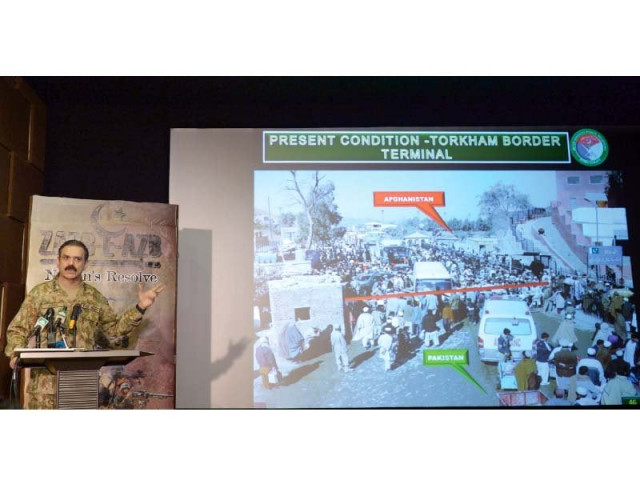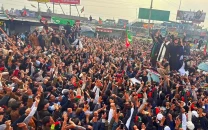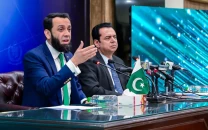Tribal areas cleansed of terrorists, says army
Torkham model will be replicated at seven other border points: Lt Gen Bajwa

Lt Gen Bajwa shows a slide with details of the Torkham border gate during a news briefing on Wednesday. PHOTO: AFP
This was stated by Lt Gen Asim Saleem Bajwa, the director general of the Inter-Services Public Relations (ISPR), during an elaborate media briefing at the GHQ in Rawalpindi.
Speaking against the backdrop of tensions at the Torkham border, he shortlisted border management as one of the major challenges to take Operation Zarb-e-Azb to its logical conclusion, and that Pakistan would not compromise on the issue of border management.
Pakistan would establish new border mechanisms at all eight border crossings with Afghanistan to check the infiltration of terrorists, he said.
The new border controls that Pakistan started implementing this month at Torkham have sparked tensions between the two countries. Afghan security forces resorted to ‘unprovoked firing’ at Torkham in an apparent attempt to stop Pakistani authorities from constructing a new gate at the busy crossing point.
“We are constructing the gate 30 metres inside our territory, so there is no reason for any objection from the Afghan side,” said Lt Gen Bajwa.
Reiterating that Pakistan will not give up its ‘legitimate right’ to strengthen controls at its borders, he announced that the Torkham model would be replicated at seven other border crossings with Afghanistan.
Explaining why Pakistan was pushing for new border controls at this time, the chief military spokesperson said investigations into some major terrorist attacks in Pakistan revealed that the attackers infiltrated through the Torkham crossing.
He specifically mentioned the September 2015 attack on the PAF base in Badabher and the terrorist attack on the Bacha Khan University in Charsada earlier this year. Over 50 people were killed in the two attacks. Lt Gen Bajwa said the terrorists who carried out the two attacks had crossed into Pakistan from Afghanistan through Torkham.
“Therefore, it is necessary that we now have better border management. We are very clear that Pakistan will not allow anyone to enter the country without valid documents,” he emphasised.
He insisted that better border management would also benefit Afghanistan and improve the security situation.
Asked about the current border clashes at Torkham, Lt Gen Bajwa said Pakistan has no intention of prolonging tensions. “Both sides are in contact both at the diplomatic and military levels and we hope the issue will be resolved as soon as possible.”
Responding to a question about the Angoor Adda controversy, the military spokesperson clarified that not an inch of Pakistan’s territory was handed over to Afghan authorities. Instead, he explained that Pakistan had built a gate on Afghan territory which was then vacated after the government approved the move.
“We had two options: either to destroy that facility or hand it over to Afghan authorities as a gift,” he said.
In response to another question, Lt Gen Bajwa said there was a dire need for a meeting between the Inter-Services Intelligence (ISI) and Afghanistan’s National Directorate of Security (NDS) to discuss the current security situation.
Recalling that army chief General Raheel Sharif recently told senior US officials that India’s RAW and the NDS were involved in stoking unrest in Pakistan, the DG ISPR said Pakistan would not allow ‘hostile agencies’ to create trouble in the country.
Operation Zarb-e-Azb
Recapping the two-year-old Operation Zarb-e-Azb, the military spokesperson said the army has cleared over 4,000 square kilometres of tribal belt of terrorists.
In North Waziristan Agency, which made up a large part of the operation, around 3,500 terrorists were killed. The military lost as many as 490 soldiers, including 16 officers, during this battle.
“Pakistan Army has recovered modern weapons from these terrorists, which they had stolen from American troops,” he told the media.
He added that the military seized 243 tonnes of explosives, enough to make improvised explosive devices for 15 years. Additionally, 7,500 bomb factories were shut down in Shawal.
Asked about US and Afghan criticism that Pakistan was still harbouring the Haqqani network and Afghan Taliban, Lt Gen Bajwa said the operation was carried out indiscriminately against all militant groups. “The world is acknowledging our achievements,” he said, reiterating that Pakistan was neither sheltering nor aiding any militant group to carry out attacks across the border.
On the temporarily displaced persons, Lt Gen Bajwa said around 61 per cent have successfully returned to their hometowns while the remaining TDPs were expected to be repatriated by the end of this year.
Karachi operation
DG ISPR said security forces have dismantled terrorist networks, target killer and extortion groups in Karachi. During the operation, 1,200 suspected militants belonging to the banned outfits and 636 target killers were arrested.
Published in The Express Tribune, June 16th, 2016.


















COMMENTS
Comments are moderated and generally will be posted if they are on-topic and not abusive.
For more information, please see our Comments FAQ